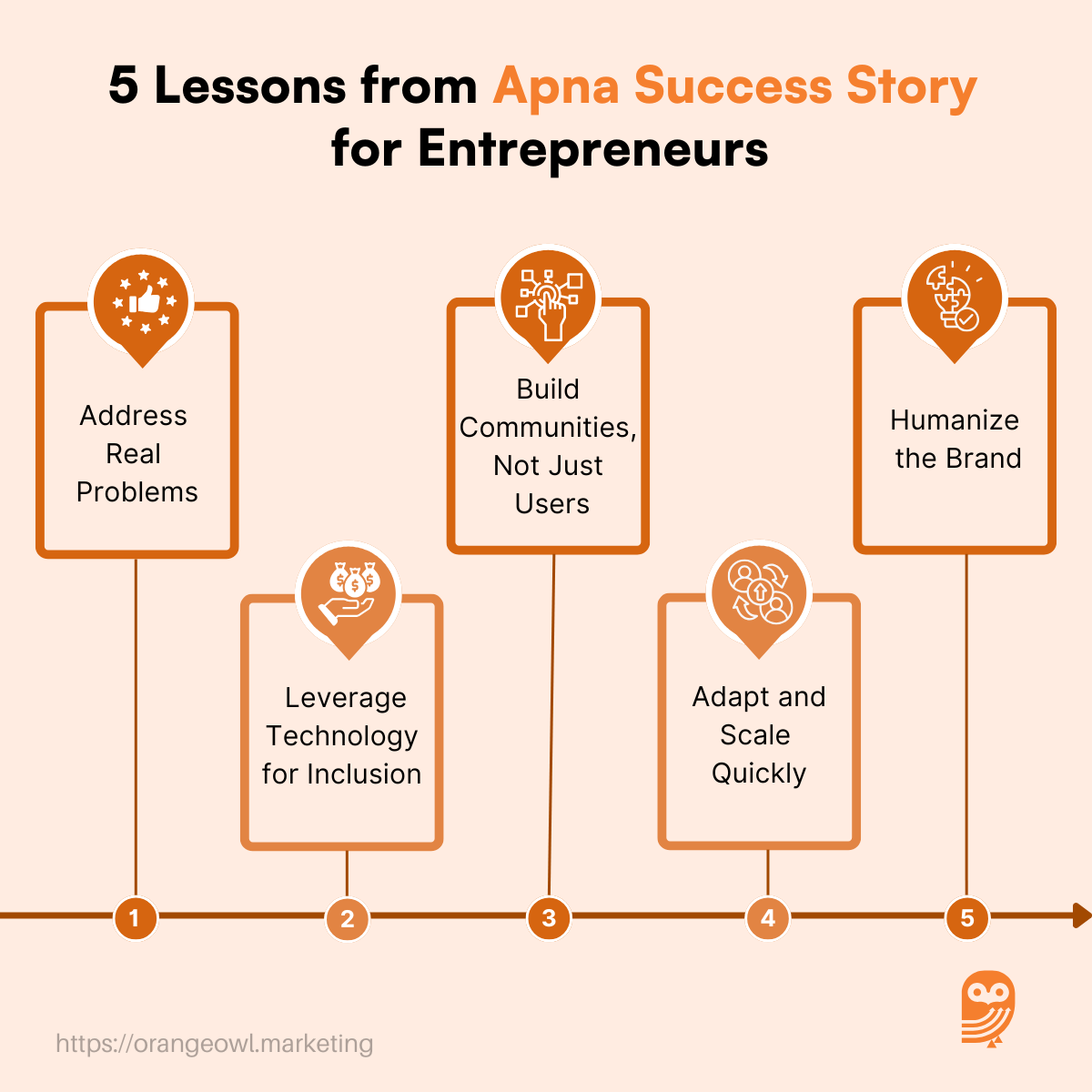Apna Success Story: 5 Valuable Lessons for Every Entrepreneur
Vivek Goel
May 29, 2025

Table of Contents
Introduction
In a country where millions of individuals actively search for jobs every day, Apna has emerged as a transformative force reshaping India’s employment landscape. Founded in 2019 by Nirmit Parikh, a Stanford graduate and serial entrepreneur, Apna was built with a singular mission: to empower India’s rising workforce, especially blue and grey-collar workers, with dignified and accessible job opportunities. What started as a simple idea to solve the friction in informal hiring quickly evolved into a nationwide movement.
Within just a few years, Apna has grown to become India’s largest professional networking and job discovery platform. It currently connects over 50 million job seekers with more than 700,000 employers across 825+ cities, playing a pivotal role in addressing India’s employment challenges. The scale of its impact is underscored by the 160 job applications it processes every minute, with over 30% of users being women, making it not only a powerful tool for employment but also a vehicle for gender inclusion in the workplace.
Apna’s model goes far beyond job listings. It uses community-driven solutions and hyperlocal targeting, offering users a platform to upskill, share advice, build professional identities, and find suitable employment without the barriers of complex onboarding or high literacy. Its mobile-first, multilingual, and intuitive interface made it accessible to first-time internet users and those in underserved regions. As a result, Apna achieved unicorn status in just two years, a rare feat even among India’s fast-growing startup ecosystem.
As Nirmit Parikh put it during one of his interviews, “India is not struggling; it’s hustling.” This quote reflects the ethos of Apna—believing in the spirit, determination, and potential of India’s everyday workers. In doing so, Apna hasn’t just built a product—it’s built a movement for equitable opportunity, inclusion, and career growth for millions.
Origin Story
The genesis of Apna lies in Nirmit Parikh’s unwavering desire to solve meaningful, large-scale problems. A Stanford graduate and former executive at Apple, Parikh had a lucrative career path laid out in Silicon Valley. However, his passion for addressing grassroots issues in India brought him back home. Long before Apna, Nirmit’s entrepreneurial streak had already surfaced—at the age of 19, he founded a startup aimed at flood prevention in Gujarat. This early endeavor signaled a lifelong commitment to impactful innovation.
The idea for Apna was sparked by a simple, yet powerful observation: millions of Indians, especially blue and grey-collar workers, were eager to work but had no efficient or trustworthy means of finding jobs. Whether it was a delivery boy, electrician, painter, or data entry operator—these job seekers lacked digital infrastructure, formal resumes, and professional networks. Existing job platforms were designed for white-collar professionals and often left the majority of India’s workforce unserved.
To bridge this gap, Parikh launched Apna in 2019, with a vision to create a mobile-first, language-agnostic, and community-based platform that would empower the underserved with not just jobs, but also learning opportunities and professional identity. Apna’s approach was revolutionary: instead of just being a job board, it became a social network for India’s working class, complete with job groups, peer discussions, and upskilling sessions.
As Nirmit Parikh explained in interviews,
“I would disguise myself as an electrician or delivery boy and go out in the field to understand the pain points of these workers.”
This level of empathy and firsthand insight became the cornerstone of Apna’s product development and brand ethos. His belief that
“India isn’t struggling; it’s hustling”
perfectly captures the pulse of the Apna community—full of ambition, grit, and untapped potential.
Business Space and Early Challenges
Apna entered an overlooked and highly fragmented segment of India’s job market—one that caters to 250+ million informal workers. While the demand for blue and grey-collar jobs was immense, the ecosystem lacked digital tools to support it. There were no standardized resumes, minimal trust between employers and employees, and rampant inefficiencies in hiring. The absence of verified professional identities and a lack of structured skill assessments made it difficult for workers to find meaningful employment, and for employers to recruit efficiently.
One of Apna’s early challenges was building trust on both ends of the platform. For workers, it meant providing a seamless, local-language interface that didn’t intimidate first-time internet users. For employers, it meant building robust verification systems and scalable hiring pipelines. Another major obstacle was breaking the digital barrier—how do you get a user without a resume or LinkedIn profile to create a professional identity? Apna solved this by enabling users to build a digital visiting card in under 60 seconds and apply to jobs with a single tap.
Moreover, the community feature, initially a risky bet, proved to be Apna’s masterstroke. Users could join industry-specific groups (e.g., carpenters, delivery boys, beauticians) to ask questions, learn from each other, share tips, and even get referrals. This peer-led support system not only improved user retention but also nurtured upskilling and mutual respect among job seekers.
Parikh’s conviction in solving real India’s problems meant starting from the ground up—literally. He recounts,
“I used to take autorickshaws around the city, talking to job seekers, and watching how they use their phones. That’s how we knew what to build.”
Such grassroots product discovery helped Apna scale rapidly while staying true to its user base.
Despite launching just months before the COVID-19 pandemic, Apna adapted quickly by facilitating remote hiring, tele-interviews, and connecting job seekers with essential services, making it a critical lifeline during one of India’s most economically challenging periods.
Growth Strategies
Apna’s remarkable growth story is built on deep market understanding, user empathy, and a tech-first mindset. At the core of its strategy is community building. Unlike conventional job platforms that treat employment as a transactional process, Apna recognized that for blue and grey-collar workers, trust and peer networks play a crucial role. To that end, Apna created profession-based communities—for carpenters, delivery personnel, electricians, beauticians, and many more—where users can ask questions, exchange job leads, share skill development tips, and emotionally support each other. These micro-communities helped in creating a sense of belonging and promoted organic engagement.
Apna’s user-centric design has also been a critical growth enabler. Understanding that a large portion of its target audience includes first-time internet users from Tier 2 and Tier 3 cities, the app was built to be simple, intuitive, and available in over 10 Indian languages. This accessibility empowered users who otherwise felt excluded from traditional digital platforms. The lightweight app interface, coupled with easy navigation, ensured that users could find jobs, create profiles, and interact with communities without any technical friction.
Another major lever was AI-driven job matching. With millions of job seekers and thousands of employers, Apna needed to ensure precise and efficient matchmaking. Leveraging machine learning algorithms, the platform quickly learned user behavior, preferences, and application patterns. As a result, users were shown jobs most relevant to their skills, location, and aspirations—making the hiring process faster and more effective. Employers, in turn, received better-fit candidates, increasing platform stickiness.
To further fuel its expansion, Apna formed strategic partnerships with government organizations, NGOs, and corporate partners. Collaborations with entities like the National Skill Development Corporation (NSDC) helped Apna tap into broader employment initiatives and reach candidates in underrepresented demographics. These partnerships also elevated Apna’s credibility in the space, positioning it as not just a job platform, but a nation-building employment ecosystem.
Finally, Apna’s approach to rapid scaling has been both agile and data-informed. The team closely monitored demand patterns across industries like logistics, delivery, construction, and customer service, and quickly ramped up supply-side efforts to meet employer needs. By focusing on high-growth sectors, deploying localized campaigns, and expanding city-wise, Apna was able to scale to over 825 cities in just a few years—an unmatched feat in India’s employment tech space.
Marketing Strategies
Apna’s marketing strategy has been pivotal in crafting its identity as a platform for India’s rising workforce. One of its most impactful tactics has been authentic storytelling. The company frequently shares real-life success stories of users who turned their lives around with Apna’s help. One such story is that of Pritam, who, after losing his job during the pandemic, used Apna to find better employment, upskill, and gain financial independence. Stories like these humanize the brand and build an emotional connection with the audience.
On the digital front, Apna has launched highly targeted campaigns across platforms like Facebook, Instagram, and YouTube. These performance-driven campaigns, often in local languages and using relatable characters, directly speak to job seekers’ aspirations and challenges. Whether it’s a short reel about how to get hired in 24 hours or an educational carousel explaining resume-building, Apna has consistently used content to educate, inspire, and convert.
To amplify its message further, Apna has also leaned into influencer collaborations. Partnering with regional influencers, content creators, and even industry professionals, Apna has managed to penetrate hard-to-reach communities. These collaborations lend social proof and extend the platform’s visibility far beyond traditional ad reach.
A key differentiator in Apna’s marketing strategy has been localized content marketing. By focusing on hyperlocal hiring trends and creating city-specific campaigns in native dialects, Apna connects more intimately with its target audiences. Whether it’s a campaign about delivery jobs in Lucknow or beautician gigs in Patna, the localization strategy ensures high relatability and response.
Lastly, Apna implemented a powerful referral program that encouraged satisfied users to invite friends and family. Given the trust-based nature of Apna’s communities, these referrals became a low-cost, high-impact growth channel. As users found value and shared their experiences, Apna’s network grew organically—turning its users into brand evangelists.
5 Valuable Lessons for Every Entrepreneur
1. Address Real Problems
At the heart of every impactful startup lies a clearly defined problem. Apna’s journey began with the realization that millions of blue and grey-collar workers in India lacked access to efficient, trustworthy job platforms. While white-collar job seekers had LinkedIn and Naukri, a vast segment of the workforce was left out of the digital hiring ecosystem.
Nirmit Parikh didn’t build Apna for headlines—he built it for everyday people hustling for their livelihoods. Entrepreneurs can take inspiration from this by solving tangible, large-scale problems that deeply affect people’s lives. Real problems lead to real solutions—and sustainable impact.
2. Leverage Technology for Inclusion
Apna used cutting-edge technology not to dazzle, but to democratize opportunity. By combining artificial intelligence with a mobile-first, multilingual interface, Apna ensured that even first-time smartphone users could access jobs relevant to their skills and location.
This is a masterclass in building for Bharat—understanding local needs, constraints, and behaviors. Entrepreneurs should see tech not just as a tool for efficiency, but as a means to bridge gaps—economic, linguistic, geographic, or educational. When tech is used to include rather than exclude, adoption becomes viral.

3. Build Communities, Not Just Users
What sets Apna apart isn’t just its job listings—it’s the sense of community it fosters. From electricians to drivers to telecallers, Apna created vertical networks where people can learn from one another, share leads, and grow together.
These micro-communities became trust networks—crucial in a segment where word-of-mouth matters more than resumes. Entrepreneurs can learn the value of building ecosystems, not just marketplaces. When users feel seen, heard, and supported, they don’t just use a product—they champion it.
4. Adapt and Scale Quickly
Apna’s ability to scale to 825+ cities within two years is nothing short of remarkable. But what enabled that wasn’t just capital—it was the company’s operational agility and responsiveness. Whether it was adjusting to pandemic-induced employment shifts or tailoring job offerings city-wise, Apna constantly iterated to meet real-time needs.
This lesson is vital: Speed and adaptability can be competitive advantages. In rapidly evolving markets, the ability to move fast—and with precision—can determine survival or dominance.
5. Humanize the Brand
Apna didn’t just focus on metrics; it focused on people’s stories. Sharing stories of job seekers who improved their lives through Apna made the platform more than just an app—it became a movement.
By humanizing the brand, Apna built trust, loyalty, and emotional resonance. This empathy-first approach shows that businesses rooted in purpose and people are more likely to endure and inspire. Entrepreneurs must remember that behind every user is a human being—and those stories matter.
Conclusion
Apna’s evolution from a fledgling startup to India’s premier employment platform is a powerful testament to what purpose-driven entrepreneurship can truly accomplish. In a crowded startup ecosystem often swayed by buzzwords and trends, Apna stayed grounded in authentic problem-solving. It didn’t build a product for vanity metrics—it built a solution that changed lives. By addressing one of India’s most pressing challenges—employment for its vast blue and grey-collar workforce—Apna didn’t just disrupt a market; it reshaped a social narrative.
Through its blend of cutting-edge technology, deep empathy for users, and grassroots community engagement, Apna has restored hope, dignity, and a sense of agency to millions. Job seekers who once relied on informal word-of-mouth channels now have a structured, supportive, and scalable platform tailored to their needs. Employers, too, benefit from faster, smarter hiring—all thanks to Apna’s AI-driven matchmaking and community-based design.
The platform’s inclusive approach, local-language accessibility, and focus on building trust and relatability have made it a household name in underserved regions of India. Beyond the technology, what truly sets Apna apart is its mission: to empower India’s workforce not just with jobs, but with opportunities for growth and upward mobility.
As founder Nirmit Parikh rightly states, “India isn’t just struggling; it’s hustling.” That single line captures the ethos of both the nation and the startup—a relentless drive to move forward, even against the odds. It’s this spirit that Apna has championed and nurtured across 825+ cities, proving that with the right intent and execution, even the most complex problems can be tackled.
For entrepreneurs everywhere, Apna serves as a blueprint for building meaningful ventures—businesses that are not only scalable and successful but also deeply human at their core. It reminds us that innovation must meet intention, and when it does, it has the power to transform societies.


